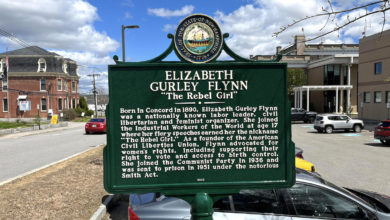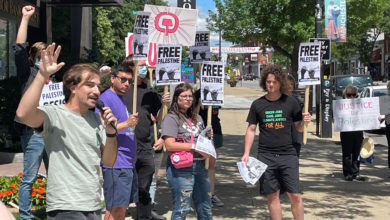The Manchester, N.H., city government carried out yet another eviction of roughly 20 homeless residents from an encampment known as The Bucket, a community deep in the woods and not visible from the road or any neighboring houses. The site became a flashpoint on June 7 when police were confronted with dozens of community members supporting their homeless neighbors resisting the sweep.
After a notice was posted demanding residents leave by June 4, local organizers and volunteers, including members of the Party for Socialism and Liberation, began bringing supplies and food to the camp, and helping residents pack up their things to move to new locations around the city. By June 7, most had left, but a few long-time residents — some who had been living at The Bucket for as long as four years — did not want to leave their home.
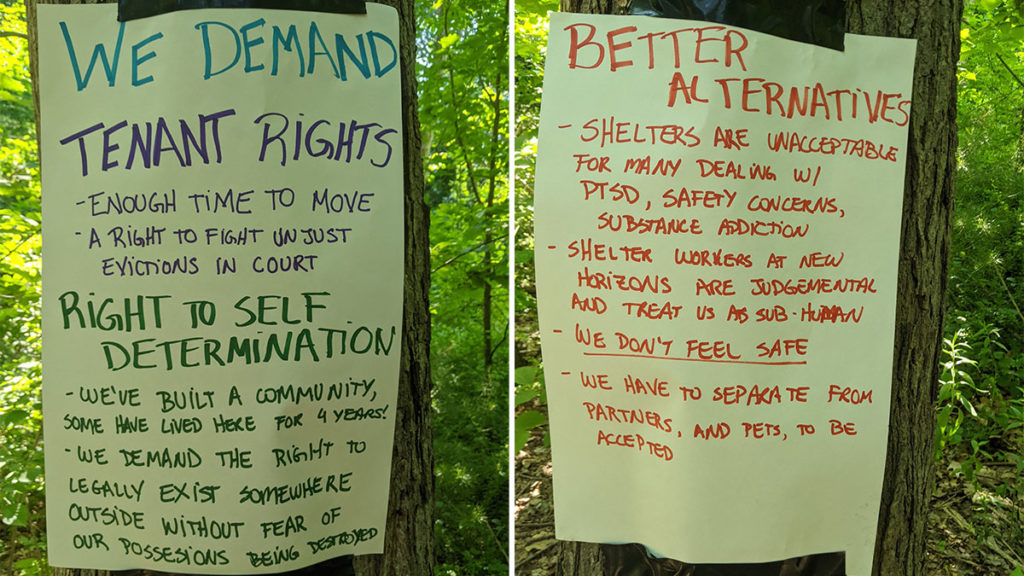
The demands raised by the remaining residents of The Bucket includes tenant rights, the right to fight unjust evictions in court, and having enough time to pack up and move — some past sweeps were carried out with less than a day’s notice. The residents also demand self determination, better alternatives to existing shelters, and “the right to legally exist somewhere outside without the fear of our possessions being destroyed.”
Community resists 11th eviction in seven months
Manchester Police arrived at 7:00 a.m., but were clearly surprised by the number of protesters present, and regrouped in a nearby parking lot, waiting for backup.
Around 10:00 a.m., six more officers arrived and began speaking with some of the roughly 30 protestors at the entrance to the camp. The police insisted they were just doing their jobs and were bound to enforce the law.

Protesters made calls to city officials, and demanded to speak to Mayor Joyce Craig and recently hired Director of Homeless Services Schonna Green. Both spent the day in meetings with police and city officials and refused to speak with protesters or residents directly. Green only arrived on site the following day, once the protest was over and nearly all the residents gone.
Police came prepared for violence
By noon, police numbered over two dozen at the front entrance, while several heavily armed officers in tactical gear blocked the rear entrance to the camp.
Joy, a community supporter, told Liberation News that at least one cop had an “AR-15” and another had “what looked to be a ground-based listening device. They took pictures and video of us as we set up barricades to prevent them from pinching us, if that was their plan.”
Another eyewitness, Chris, described seeing “cops in tactical gear, one with what looked to be a long rifle. The first time simply walking with the barrel towards the ground. The second time, kneeling, watching protestors through the scope. It was pretty nerve wracking that the police came prepared for that level of violence.”
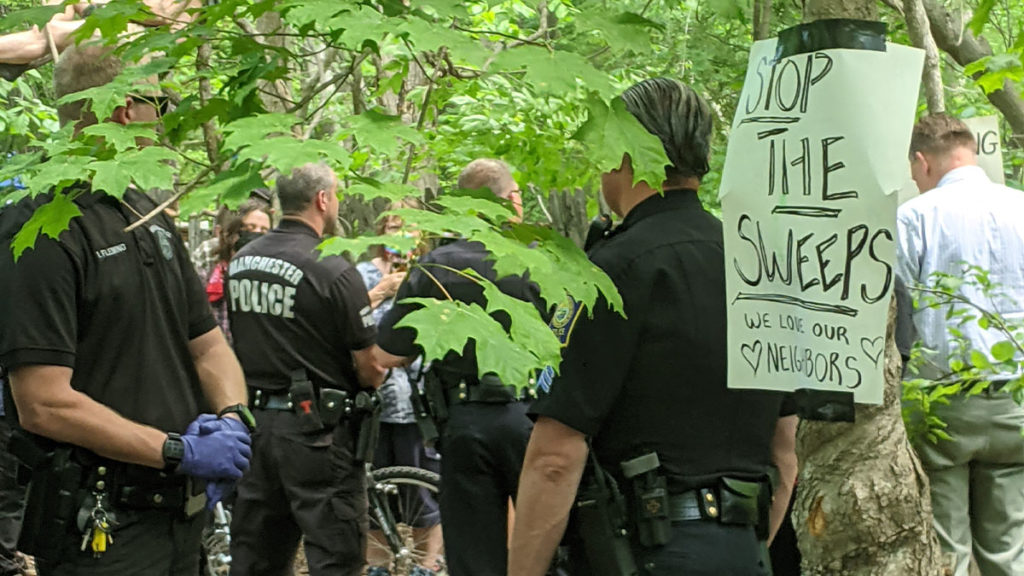
Protesters built barricades and blocked the entrances with their bodies and cars in an attempt to buy time for residents to pack and to restate their demands. Police threatened to arrest the protesters and tow their cars, and managed to clear space for two large dumpsters at the entrance.
Frustrated by the standstill, the police eventually retreated. No arrests were made.
A cleanup crew and much smaller group of officers arrived the following day to clean up what remained of the camp, agreeing to work around those residents who were still packing up. Community volunteers continued to help the former residents of The Bucket move their belongings to new locations into the night. Several residents still remain.
‘The city can’t just force people into shelters by sweeping camps‘
The response to this situation from city officials has been more of the same. They insist that people can simply check into a shelter without addressing the safety concerns raised in The Bucket resident’s demands. Mayor Joyce Craig released a statement claiming “there are currently 40 clean, safe, beds available at Families in Transition,” neglecting to acknowledge that the hundreds of unsheltered homeless people in Manchester still feel safer sleeping outside than staying at the FiT shelters.
According to one volunteer, Grady, organizers spent “days helping maybe a dozen people move to new locations around the city, and not one person asked to be taken to a shelter. The city can’t just force people into shelters by sweeping camps.”
Alderman Pat Long said in interview with Manchester Ink Link that homeless people just want to live without rules or responsibilities, and that it isn’t the city’s responsibility to provide housing for anyone. He asked “who will pay for it?”
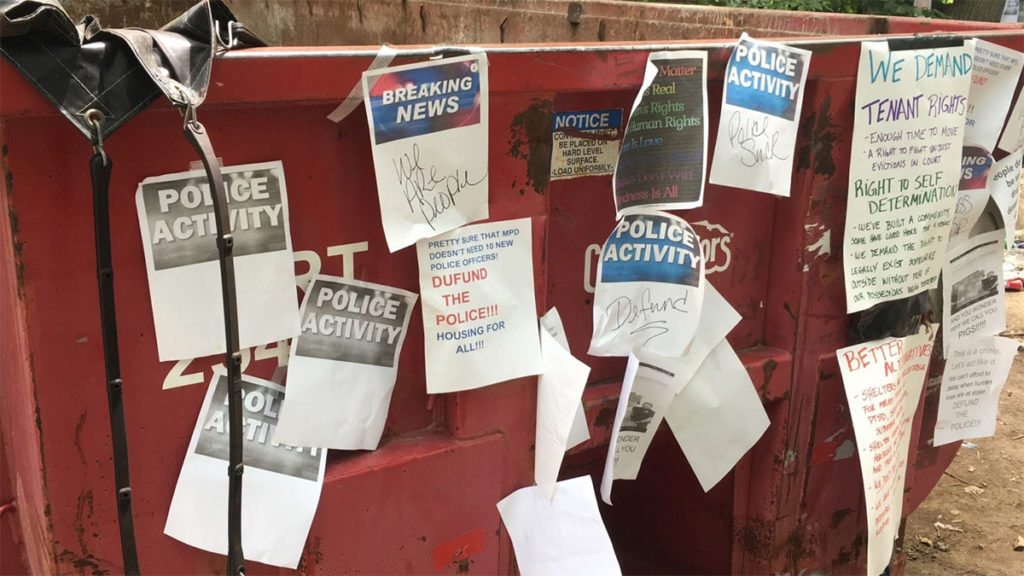
The City of Manchester has no problem paying for dozens of officers, dumpsters, tow trucks and cleaning crews to destroy people’s homes and communities — money that could go toward housing people instead. Currently the city pays $194 per taxpayer to the police, and only $9 to social services.
The city budget could be written with the needs of working class and poor people in mind. The City of Manchester will vote on its 2022 budget on Tuesday, June 15. The proposed budget would give an additional $1 million to the Manchester Police Department, bringing the MPD budget to more than $40 million per year. The budget also proposes hiring an additional ten police officers.
A ‘better alternative’ is possible
Governor Chris Sununu has said that “homelessness is going to be an issue we constantly have to deal with,” (Union Leader) but it doesn’t need to be. The city has the funds to build affordable housing, improve and expand addiction recovery and mental health services, and create public spaces outdoors where all are welcome.
The City of Manchester must immediately halt all sweeps of homeless camps, fully address all grievances with existing shelters, and actually listen to the homeless residents of Manchester and meet their demands. Until then, the people stand ready to resist eviction attempts.

